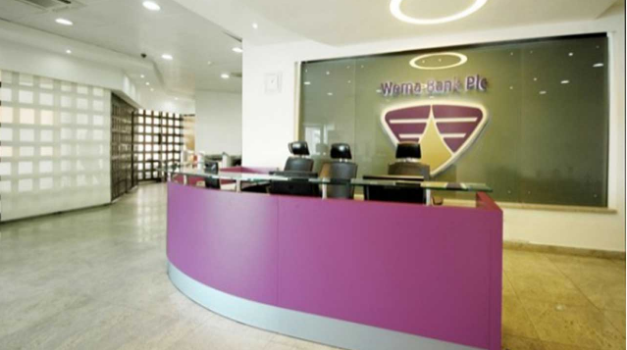Wema Bank PLc. has releases its audited audited financial result for the year ended December 31st, 2017. The bank, which launched ALAT, Africa’s first fully digital bank, confirmed the growth of its groos earnings by 20.07%, from N54.36 billion in FY2016 to N65.27 billion in FY2017.
The growth was supported by the launch of ALAT – Nigeria’s first fully digital Bank, enhancing Wema Bank’s already existing alternate platforms which recorded a combined growth rate of 205.67% in transactions executed and with an estimated 30,000 accounts opened monthly.
Commenting on the results, the Managing Director/CEO of the Bank Segun Oloketuyi provided further insights into the performance of the Bank during the period.
“Despite the slow start to the year, 2017 recorded significant progress, highlighted by the introduction of the Investor & Exporters (I&E) window and recovery in oil prices,” Oloketuyi noted.
“Our target market is the upwardly mobile youth segment, the young entrepreneurs, the young professionals and the financially excluded, where we continue to leverage incremental innovation and integral capabilities. For us, banking should be simple, reliable and convenient,” the Wema Bank MD added.
In view of the Bank’s commitment to incremental innovation, the Bank was recognized as the Best Digital Bank, Best Mobile Banking app, Digital Banking Platform of the year, Best Digital Bank in Africa, Best & Most Innovative Digital Solution and Excellence in Branchless Banking by World Finance, the Asian Banker and Business Day – reputable organisations located in Africa, Europe and Asia.
Oloketuyi added: “We continue to execute our omni channel business model with precision, as we made in-roads to Kaduna, Bauchi, Kano, Mararaba (Nasarawa), Warri, Aba, Sangotedo (Lagos) and Lagos State University (LASU). Furthermore, we recorded increases in the number of strategic partnerships forged and expect this trend to further gain momentum.
“In October, the Bank held its Extra-Ordinary General Meeting (EGM) towards its proposed Capital Reorganisation Scheme. I am delighted to announce that the exercise has been concluded, with all relevant regulatory approvals in place and duly passed and reflected in the 2017 financial year accounts. As earlier highlighted, the conclusion of the exercise would lead to an efficient balance sheet, as ploughed back profit can be capitalised to grow the business while positioning the Bank for dividend payment in the near term.
“I would like to appreciate our esteemed shareholders for their patience and the trust reposed in us. We are now in the final stage of our three-pronged strategy; stabilise the bank (2009 – 2012), reposition the bank (2013-2017) and grow the Bank (2017 and beyond).”
“We approached the money market in November 2017 to raise N25 billion in two Series under a commercial paper Program; Series 1 N10 billion – 182-day tenor and Series 2: N15 billion- 270-day tenor. Given the relative decline in interest rates and possible growth within the economy, the Bank will be re-opening the 2nd series of its N50 billion debt issuance program. This should commence from the second quarter of the year.”
According to the Wema Bank MD, the Bank’s commitment to excellence positioned it for a top-8 finish at the 2017 KPMG Banking Industry Customer Survey. It, therefore, stressed commitment to improving its capabilities towards the attainment of sustainable competitive advantages, especially a top-5 finish in 2018 and increasing market share.
In his own review of the result, Chief Finance Officer Tunde Mabawonku noted that the Bank’s 2017 result was reflective of its continued resilience despite realities arising from increased impairment charges during the period.
The Bank’s earnings from non-interest income remained strong, growing by 24.44% from N9.80 billion in 2016 to N12.19 billion in 2017; surpassing its 2017 guidance of a 19% growth rate.
The Bank closed with a Profit before Tax (PBT) of N3.01 billion (2016; N3.24 billion), despite reporting an increase in impairment charges which rose from N0.42 billion in 2016 to N2.18 billion in 2017.
“Risk management remains at the core of our operations, as we leverage on our prudent risk management practices and reported a Non-Performing Loan (NPL) ratio of 3.52% (2016; 5.01%) while our Capital Adequacy Ratio (CAR), closed at 14.32% (2016; 11.07%). We remain confident, that the Bank’s credit rating will continue to remain affirmed at investment grade level,” Mabawonku noted.
He expressed the Bank’s commitment to sound risk management while leveraging its digital platforms, built capabilities in lowering the cost of service and attaining competitive advantages.
“In addition, with our positive retained earnings account, the balance sheet has now been repositioned for efficiency,” Mabawonku concluded.
Financial Performance Review
| Income statement | 2017 FY
(N’bn) |
2016 FY
(N’bn) |
(∆) |
| Gross Earnings | 65.27 | 54.36 | 20.07% |
| Interest Income | 53.07 | 44.56 | 19.10% |
| Non-interest income | 12.19 | 9.80 | 24.38% |
| Operating expense | 26.77 | 24.79 | 7.99% |
| Profit Before Tax | 3.01 | 3.25 | -7.38% |
| Profit After Tax | 2.26 | 2.56 | -11.72% |
| Earnings Per Share | 5.8 kobo | 6.6 kobo | -12.12% |
| Balance Sheet | 2017 FY
(N’bn) |
2016 FY
(N’bn) |
(∆)
|
| Total Assets | 388.15 | 424.04 | -8.46% |
| Loans and Advances | 215.84 | 227.01 | -4.92% |
| Deposits(customers) | 254.46 | 283.30 | -10.18% |
| Shareholders’ Funds | 49.62 | 48.50 | 2.31% |
Highlights
- Gross earnings increased by 20.07% (Y-o-Y) from N27 billion to N54.36 billion.
- Profit Before Tax (PBT) decreased to N01 billion (2017) from N3.25 billion (2016).
- Profit After Tax (PAT) declined by 11.72% to N26 billion (2017) from N2.56 billion (2016)
- Customer Deposit (savings) increased 9.76% (Y-o-Y) to N83 billion from N45.40 billion due to improving brand acceptance and market share.
Ratios
- Loan to Deposit Ratio: 84.82% (70.86% as at December 2016)
- Non-Performing Loans Ratio to 3.52% (5.07% as at December 2016)
- NPL Coverage Ratio: 136.98% (100% as at December 2016)
- Capital Adequacy Ratio (CAR): 14.32%













